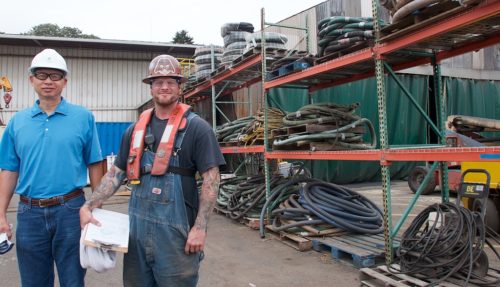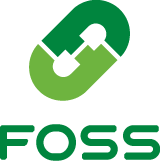Foss Launches ‘Continuous Improvement’ Program; It Starts in Shipyard and Soon will Encompass Entire Company
A new system for organizing paint and other paint-shop supplies is saving time and delivering improved efficiency at the Foss Seattle Shipyard. And laborers need look no farther than a well-located rack for their sandblasting equipment, which formerly might have been scattered about the shipyard.

Michael Dong, left, worked with Paint Shop Foreman Jared Tegantvort to improve storage of sandblasting equipment for easier retrieval. The equipment is within easy reach on the racks behind them.
Those are just a couple of examples of how a newly installed “Continuous Improvement (CI)” program is working at Foss Maritime. The company-wide effort is being spearheaded by Michael Dong, who became Foss’s first director of continuous improvement at the end of 2017.
“We’re on our way, and the goal is to make this organization more nimble and adopting and practicing continuous improvement by the end of the year,” Dong said recently. “There’s a big effort to get that done.”
The concepts of continuous improvement and lean were pioneered by Toyota decades ago and have spread throughout the business and industry world as a way to improve work processes and boost the bottom line.
A key to the implementation process, according to Dong, is establishing a culture in which employees are continually looking for what are known as the “eight deadly wastes.” Going by the acronym DOWNTIME, they are defects, overproduction, waiting, non-value-added processing, transportation, inventory excess, motion waste and employee/people waste.
“If every business unit would focus on wastes, we could find all sorts of areas where there’s room for improvement,” Dong said. “And once you’ve identified the wastes, continuous improvement drops in and says, ‘What do we do about it?’ You put together a plan, execute it and then review to see how you’re doing.”
Dong came to Foss after 30 years in the petroleum industry, working for Unocal 76, ARCO and BP, where he was the supply-chain manager in Alaska.
“When they had a major project they would call me in to look at the processes,” he said. “We did a lot of process mapping which helps you understand the work flow and enables you to identify things that aren’t value-added.”
Since assuming his new position at Foss, Dong has been making presentations on continuous improvement and lean to the company’s various business units and now has an organization of about 40 “CI Champions,” who are also going through training in CI.
In the shipyard, which is Dong’s initial focus, the shop foremen are the champions. After finding “wastes” in painting processes, the shipyard has moved to other crafts within the shipyard. Eventually all of the crafts will be brought on board, as will the entire company.
“It’s a mindset, a culture, and a habit that you want to establish throughout,” he said.
